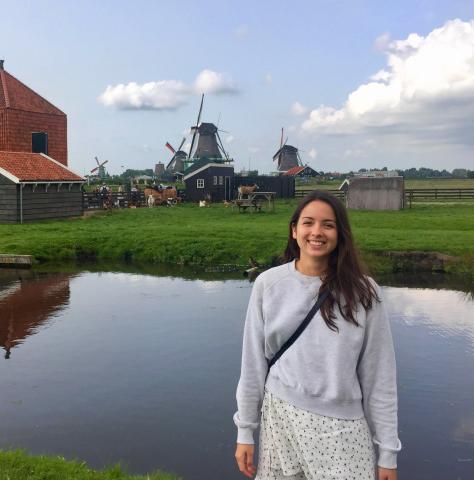Within days of her twelfth birthday, the youngest age someone can get PADI Open Water SCUBA certified, Roxanne Diaz had completed her diver certification. From that day on could be found out in the warm waters of South Florida as often as her dad would take her. “The oceans and fish have always been my thing,” she says, when asked what inspires her work today. “Fish are such weird and interesting creatures, and they face so many problems in their environments, most of which we don’t immediately see. When you spend time in their element, it’s a different world.” A world, says Roxanne, that needs advocates.
She majored in marine biology at the University of North Carolina, Wilmington, graduated early, and took a job at the North Carolina Aquarium in addition to a research assistant position at an aquaculture facility. By then Roxanne knew that she wanted to be a problem solver. Her undergraduate thesis on the genetic impact of minute amounts of a particular pesticide on inland silverside fish had made her realize the difference between work that identifies a problem and work that uses that information to develop solutions.
That led me to search for a graduate program that would equip me with the tools and skills to solve problems. It led me to Bren.
As a Master of Environmental Science and Management student at Bren, Roxanne got her first choice of group projects; the subject of her group project was Systematizing the Implementation of No-take Marine Reserves in the Mexican Caribbean. The end report provided the clients, Fundación Claudia y Roberto Hernández, Kanan Kay Alliance, and The Summit Foundation, with the development of a sustainable, systemic and fact-based process that enhances the creation and design of successful no-take zones.
In terms of the project’s influence on her work today, she says, “It prepared me to work effectively on a team of individuals, and with many stakeholders. You have to be able to collaborate. In our group project we worked with other stakeholders in Mexico. We learned how to align our individual skills and experience. This is critical in my job today, where we work with a lot of government entities, NGOs and communities.”
When asked how she landed her job as Communications Manager for the World Fish Migration Foundation, based in the Netherlands, she says, “I networked, networked, networked. I found out about the job through a Bren connection. I’d told him I wanted to work in the Netherlands, which is a really random place, and this connection happened to have looked at his friend’s LinkedIn page two hours earlier, where he had just posted a job in Haarlem, outside of Amsterdam!”

She now works in a field that is closely aligned with her passion for underwater ecosystems. “We work on different international projects related to freshwater issues, like dam removals, and I’m leading the communications on these projects. For example, my manager launched the international World Fish Migration Day in 2014, and we are collaborating with partners around the world to get coverage for this year’s celebration.”
Roxanne says she really values Bren’s group project emphasis and getting a collaborative team experience of working toward a common goal. "We all knew we could work independently, but Bren emphasized the team, whether groups or in pairs, and the benefit of bringing different roles. It solidified the concept that working together is how we best achieve our goals.”
To a future student, Roxanne would say, “Bren has a lot of resources to tap into, not only the Career Center, which is great, but the entire Bren community. Every professor, every grad student and alum is more than willing to help you move forward, now or 10 years down the line.”
